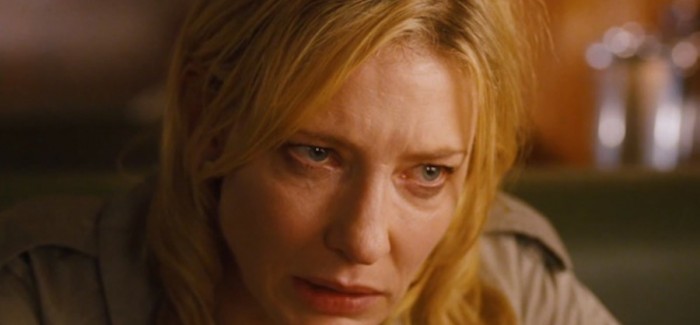VOD / Blu-ray film review: Blue Jasmine
Review Overview
Cate Blanchett
10Sally Hawkins
10Blue Moon
10David Farnor | On 03, Feb 2014
Director: Woody Allen
Cast: Cate Blanchett, Sally Hawkins
Certificate: 15
Watch Blue Jasmine online in the UK: Amazon Prime / TalkTalk TV / Apple TV (iTunes) / Prime Video (Buy/Rent) / Rakuten TV / Google Play
For years now, people have cried comeback for Woody Allen. Now, though, it’s happened. Actually, properly happened. Blue Jasmine is an excellent return to peak form for the director. It’s not one of his early, funny ones. No, this is the opposite. Living up to the colour in its title, the film is brilliantly, unrelentingly miserable – a tragic character study that sits alongside Hannah and Her Sisters in Woody’s back catalogue and showcases an astonishing Cate Blanchett.
She plays Jasmine, the former wife of Hal, a slimy financial type (the perfectly slick Alex Baldwin). But after he did a Bernie and Madoff with her cash, she finds herself left with nothing. Apart from her sister, Ginger (Hawkins). And her jewellery. And her suitcases. After all, she can’t sell those. They’re Louis Vuitton.
So the newly single Brooklynite slums it in San Francisco, turning her nose up at the commoners. Her spiky, selfish reactions to Ginger’s working-class friends are as bitter as they are amusing, especially when they start trying to hit on her. “Have you ever been high on nitrous oxide?” stammers a superb Michael Stulbarg as her awkwardly aroused dental employee.
Woody balances the funny and the fraught in a way that recalls Crimes and Misdemeanours, but manages to go back and forth over the social divide too; where San Francisco could have been full of blue collar stereotypes, his ensemble – particularly Bobby Cannavale as Ginger’s boyfriend, Chili – flesh out their roles into characters who are equally hard hit by Hal’s financial fall-out.
Economic crisis looms over the whole piece, but so does the ghost of Tennessee Williams. Her sister essentially still a stranger, Jasmine relies on her kindness (and that of Peter Sarsgaard’s naive suitor Dwight) with all the crumbled pathos of a 21st Century Blanche DuBois. Popping pills and downing martinis, she’s a victim of the modern world as much as herself. In a turn that demands all the awards going, Cate Blanchett doesn’t act; she falls apart on screen, twitching and staring blankly before sitting on a park bench talking to herself. The fantastic Sally Hawkins matches her performance every step of the way, kind where she is cruel, looking to the future while Jasmine stays in the past.
Perhaps even more impressive than the cast, though, is the editing. Alisa Lepselter – a collaborator with Woody ever since Sweet and Lowdown – cuts between past and present with a ruthless pace, from Jasmine’s anecdotes and nights out to confused onlookers and suddenly back to her face, broken. All the while, Conal Fowkes’ heartbreaking rendition of Blue Moon plays in the background. “You know Blue Moon,” she says to anyone who will listen. “It’s the song that was playing when Hal and I met.” Then, guitar strings start to pluck like someone’s pulling her nerves – right up to breaking point.
The best version of A Streetcar Named Desire since the musical by The Simpsons, the sombre, reflective mood couldn’t be more different to Woody’s last film, To Rome with Love. This isn’t the same director who famously rushes through scenes with one take; here, Allen’s most powerful moments come when he lets the camera roll on long, still close-ups of his leads. One scene where Ginger receives bad news on the phone is a triumph of under-acting, topped only by the conflict forever playing over Jasmine’s haggard features. For all of Blue Jasmine’s laugh-out-loud dark humour, Woody hasn’t captured such complex maturity since he made Husbands and Wives 12 years ago. This feels equally raw.
As Jasmine’s depression slowly unspools, the struggle of America to move on from its financial corruption is writ small on an emotional canvas. But the drama’s personal impact is what leaves an impression. If Midnight in Paris was a nostalgic ode to the swooning romance of the past, Blue Jasmine is the cold, brutal morning after, where the past catches up to the present – and leaves it shattered.
A masterpiece.
The Disc / Extras
Nobody ever buys a Woody Allen disc for the extras – because there aren’t any. Perhaps unsurprising for a director who never likes to watch his own films, let alone record a commentary over the top, special features don’t want to belong to any disc that would have them as a special feature. Blue Jasmine’s DVD and Blu-ray discs, then, are something of a collector’s item: they actually have bonus content.
Midnight in Paris included a few minutes of interviews with the actors, but Blue Jasmine marks something of a step up: we get a five-minute EPK of cast comments – after years of nothing, might that become the new standard for Woody releases? – but also footage of a press conference. Ranging from Cate Blanchett talking about taking on such a challenging role and comedian Andrew Dice Clay discussing improvising on set and Peter Sarsgard revealing how important costume was to him getting into character – “I had Ralph Lauren socks!” – it’s a surprisingly insightful 25 minutes. Combined with the Blu-ray’s stellar audio and visual transfer (the San Francisco landscape still looks stunning), the result is the most fully-rounded Blu-ray and DVD release for a Woody Allen film to date.
While extras are becoming increasingly common on iTunes and blinkbox releases, these special features are not available on the film’s digital formats. But after years of no extras at all, the idea of getting “only a Woody Allen film” is hardly a disappointment – especially when the film in question is so good.
Blue Jasmine is available to watch online on Amazon Prime Video as part of a Prime membership or a £5.99 monthly subscription.
Where can I buy or rent Blue Jasmine online in the UK?






















